- International
- Education Jobs
- Schools directory
- Resources Education Jobs Schools directory News Search


Creative Writing Scheme of Work
Subject: English
Age range: 11-14
Resource type: Unit of work
Last updated
29 January 2024
- Share through email
- Share through twitter
- Share through linkedin
- Share through facebook
- Share through pinterest

Creative Writing and Short Stories - incredibly detailed scheme of work on writing skills (AO5, AO6 English Language Paper 1) that includes activities and resources for over 17 lessons! Includes differentiated activities to three levels (core, support and more able), homework activities and more. What’s more, it’s completely FREE to download! Topics covered include language, structure, vocabulary, genre, organisation, cohesion, settings, characters, themes and more!
To work in conjunction with our Creative Writing KS3 pack: https://www.tes.com/teaching-resource/creative-writing-12404849
Creative Commons "NoDerivatives"
Get this resource as part of a bundle and save up to 65%
A bundle is a package of resources grouped together to teach a particular topic, or a series of lessons, in one place.
Creative Writing
Creative writing complete scheme of work pack. Designed for KS3 students but easily adaptable for GCSE English Language students, the pack includes resources on both narrative and descriptive writing. Includes: 1) Creative writing introduction 2) Characters - developing mystery and mysterious figures focused on The Signal-Man 3) Plot development and structure lesson around The Signalman 4) Structure and endings lesson exploring The Signalman and other examples 5) Speech punctuation and character development lesson 6) Themes and motifs lesson 7) Genre lesson exploring westerns, their conventions and how students can adapt genre themselves 8) Setting and descriptive writing lesson, exploring structure and vocabulary 9) Vocabulary improvement lesson with a focus on character 10) Pathetic fallacy and personification 11) Short story analysis - plot, structure, narrative voice 12) Short story structure analysis 13) Creative writing punctuation workshop with differentiated worksheets 14) Assessment planning lesson 15) Assessment review lesson 16) Short story analysis of language - Desiree's Baby 17) Short story analysis - structure 18) Six week homework pack 19) Six week scheme of work document
Your rating is required to reflect your happiness.
It's good to leave some feedback.
Something went wrong, please try again later.
This resource hasn't been reviewed yet
To ensure quality for our reviews, only customers who have downloaded this resource can review it
Report this resource to let us know if it violates our terms and conditions. Our customer service team will review your report and will be in touch.
Not quite what you were looking for? Search by keyword to find the right resource:
- Primary Hub
- Art & Design
- Design & Technology
- Health & Wellbeing
- Secondary Hub
- Citizenship
- Primary CPD
- Secondary CPD
- Book Awards
- All Products
- Primary Products
- Secondary Products
- School Trips
- Trip Directory
- Trips by Subject
- Trips by Type
- Trips by Region
- Submit a Trip Venue
Trending stories

Top results
- The Best Creative Writing Resources For Teaching Plot And Setting In Ks3 English
KS3 creative writing – Resources for teaching plot and setting
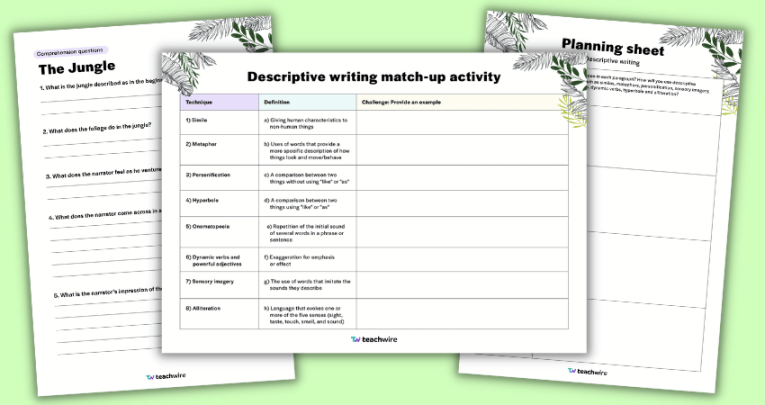
Whether students want to create an epic adventure in a fiery inferno or tense tale in a sleepy town, make sure they create a compelling plot and a fully realised setting with these resources…

Unlock the full potential of your students’ creative writing with these top-tier resources for teaching plot and setting, designed specifically for KS3 English teachers…
KS3 creative writing resources
How to teach world building, storyboard templates.
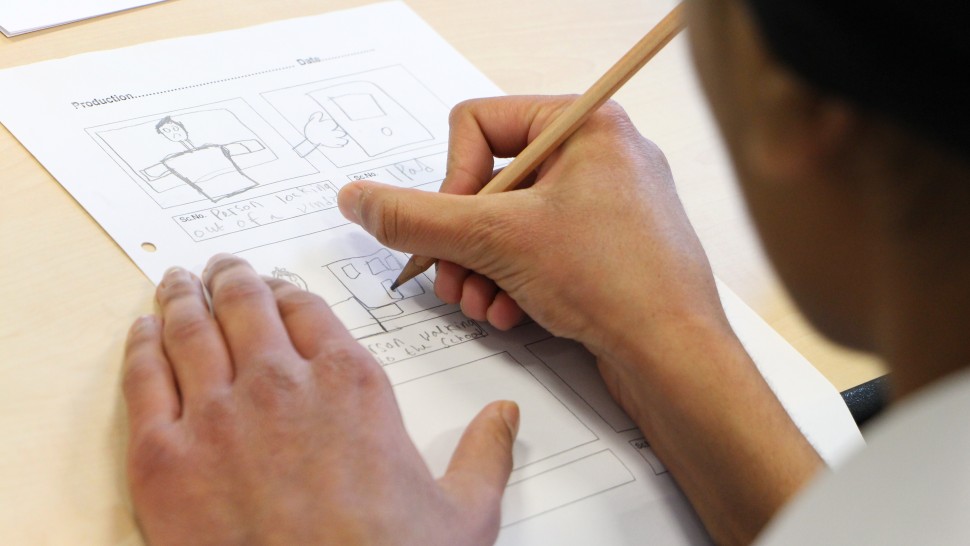
Whether it’s short stories, comic strips or filmmaking, every tale needs the right structure to be told well. Having a beginning, middle and end may be a staple of storytelling , but alone it’s not enough, and there are many ways to tell a story.
But however you choose to write yours, one thing is constant – good stories need good structure. These storyboard template resources and activities will help your students develop the skills required to add that foundation to their creative writing.
Year 7 English worksheets
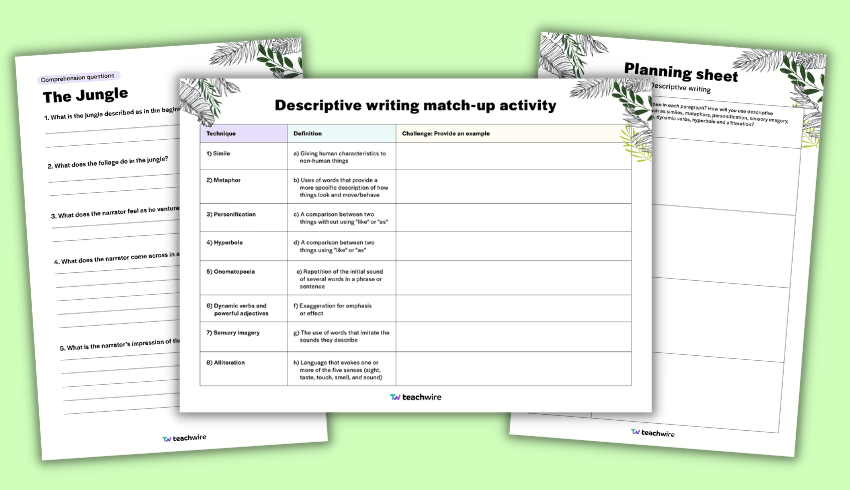
Get to grips with descriptive writing across two lessons with these free Year 7 English worksheets which focus on a piece of text all about the jungle.
Inspiring images and sticky notes
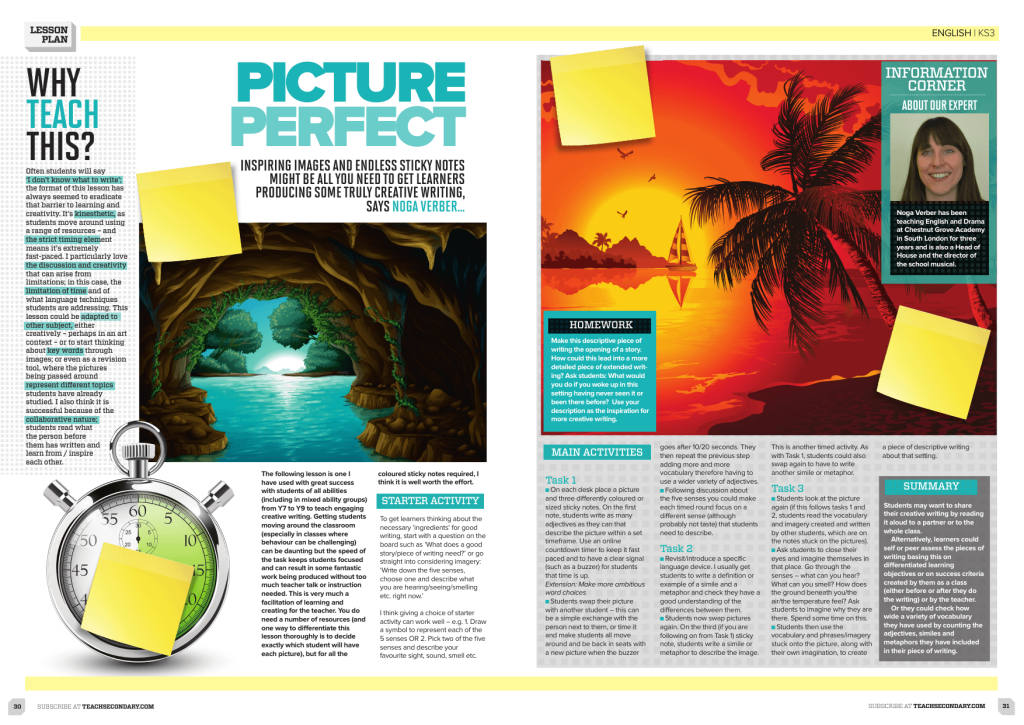
This creative writing KS3 lesson uses inspiring images and sticky notes to get learners producing some truly creative writing.
The collaborative nature of this lesson (students read what the person before them has written) means they learn from and inspire each other.
Create a spooky atmosphere
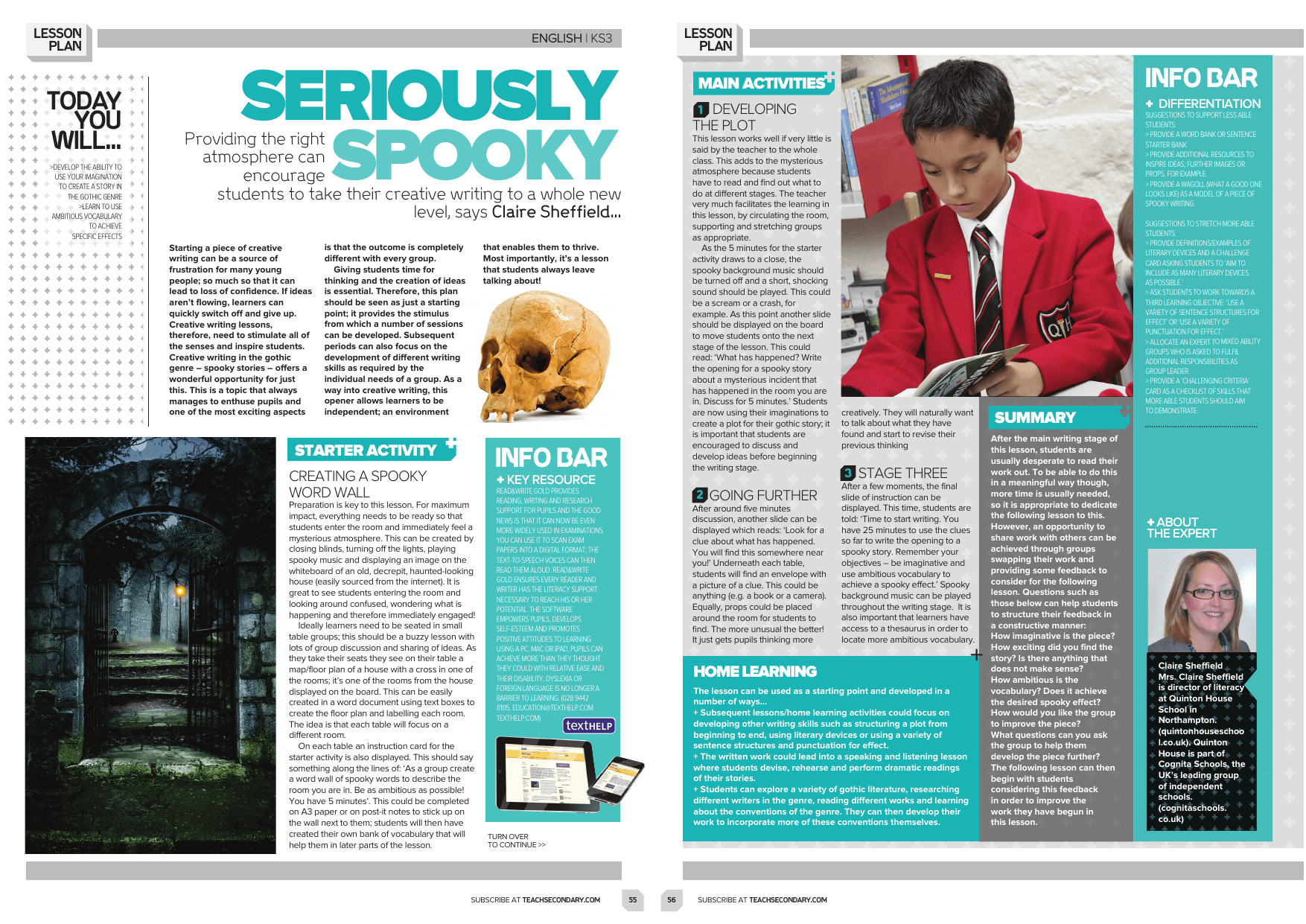
This Gothic setting description lesson plan will encourage students to take their creative writing to a whole new level. Start by closing the blinds, turning off the lights, playing spooky music and displaying an image on the whiteboard of an old, decrepit, haunted-looking house.
Setting description examples
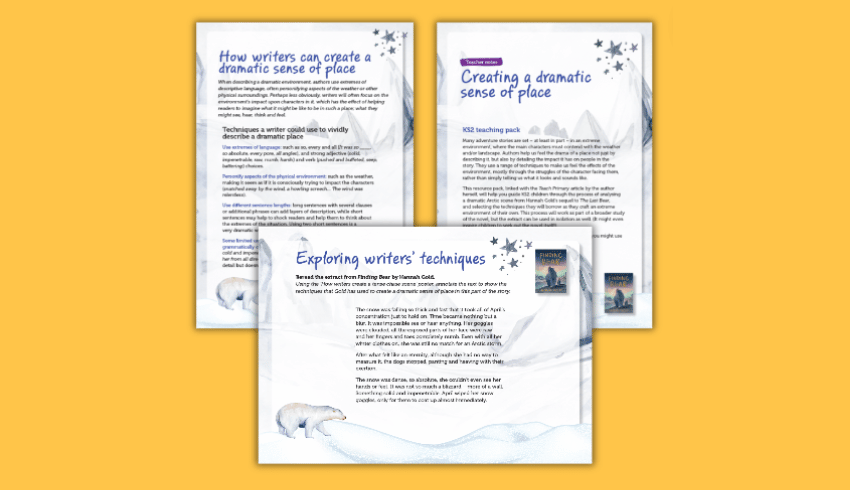
Use this setting description resource pack to help pupils refine their descriptive writing skills. The pack contains an extract from Finding Bear by Hannah Gold, as well as worksheets, teacher notes and more.
KS3 structure lesson plan
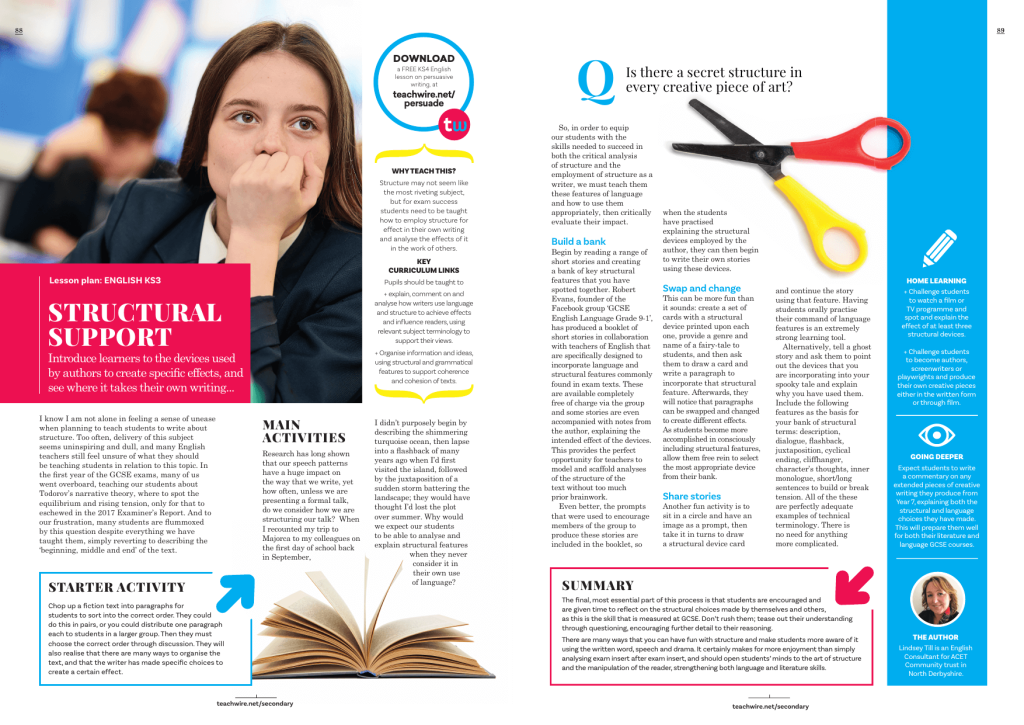
Structure may not seem like the most riveting subject, but for exam success students need to be taught how to employ structure for effect in their own writing and analyse the effects of it in the work of others.
Start this lesson by choping up a fiction text into paragraphs for students to sort into the correct order.
Writing the middle part of stories
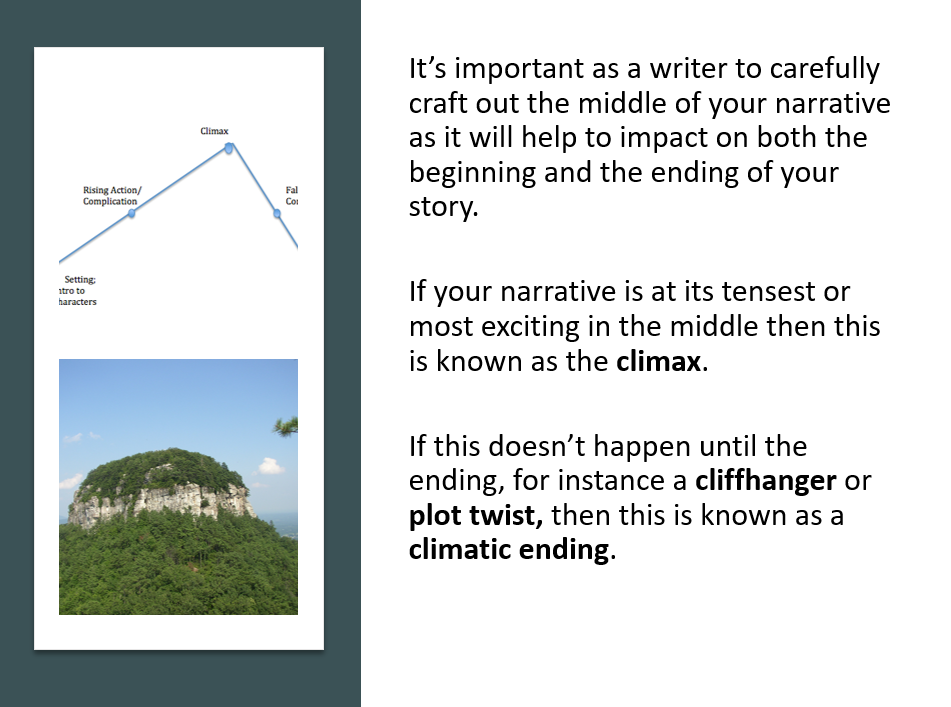
This fully differentiated and resourced lesson will help students with writing the middles of narratives and stories. This is excellent preparation for GCSE writing exams.
Monster consequences descriptive writing lesson
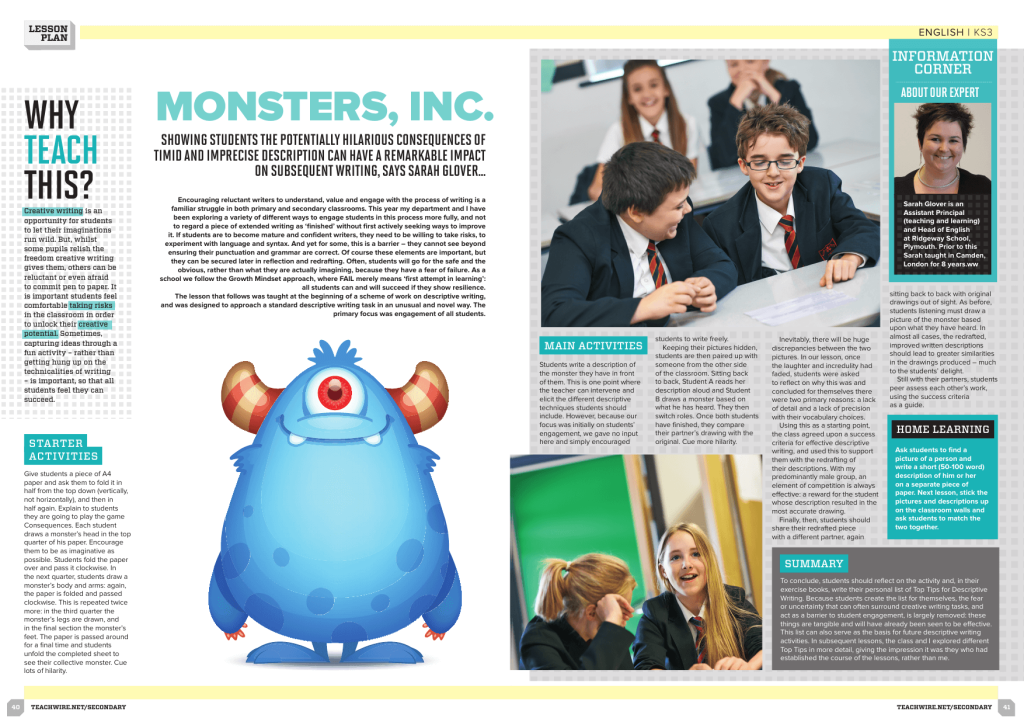
Use this descriptive writing KS3 lesson to show students the potentially hilarious consequences of timid and imprecise description. It just might have a remarkable impact on subsequent writing…
Describe a sweet shop
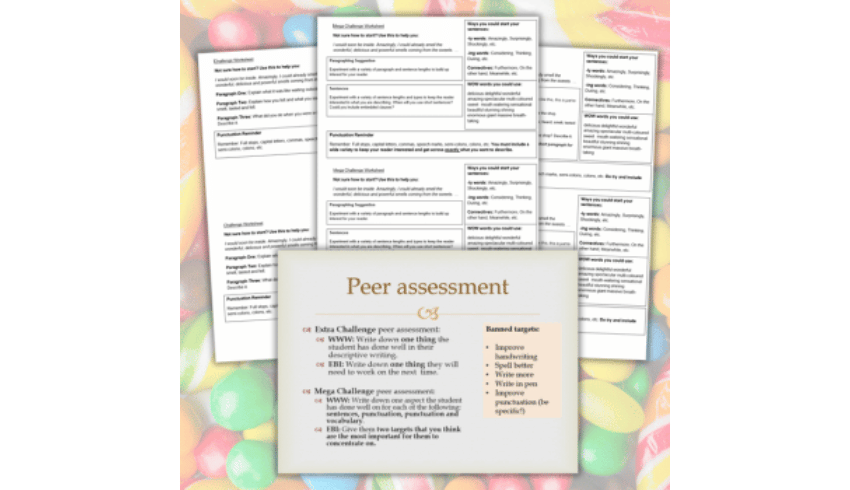
This free resource will engage more advanced students in Key Stage 3. It focuses on crafting vivid descriptions of a sweet shop. This is a topic ripe with potential for rich, sensory language and imaginative exploration.
Descriptive dystopian writing lesson plan
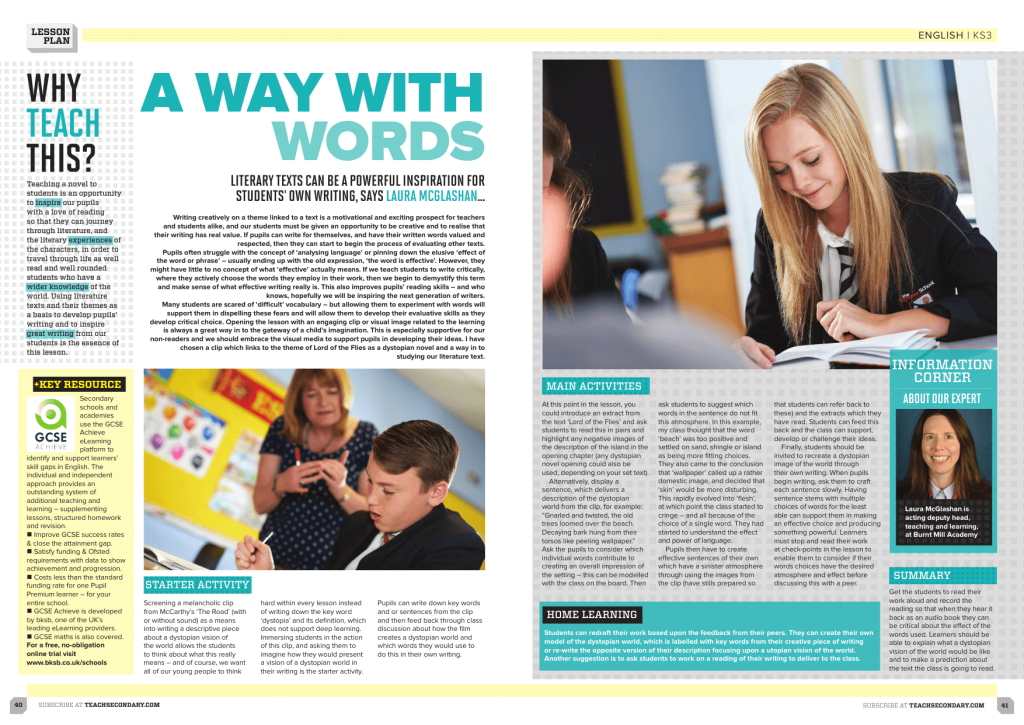
This KS3 critical writing lesson starts with a clip from 2009 post-apocalyptic film The Road . Feed back through class discussion about how the film creates a dystopian world. Which words would students use to do this in their own writing?
Use The Hobbit to write about tunnels
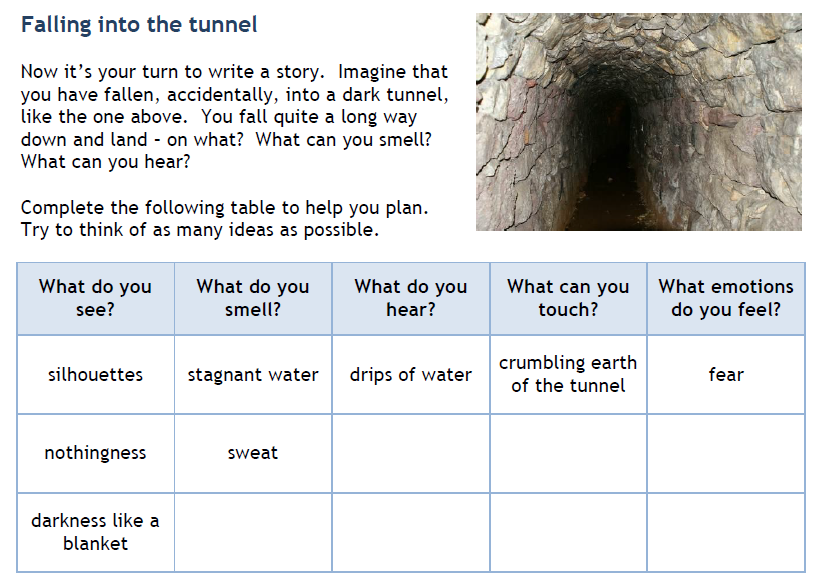
In this ‘build your own adventure story’ resource students discover new lands, and overcome monsters and other obstacles.
It begins with a passage from JRR Tolkien’s The Hobbit , where Bilbo finds himself in a dark cave and meets Gollum for the first time. There are 10 pointers to look at to explore the passage, before students begin to write their own story.
The place as character
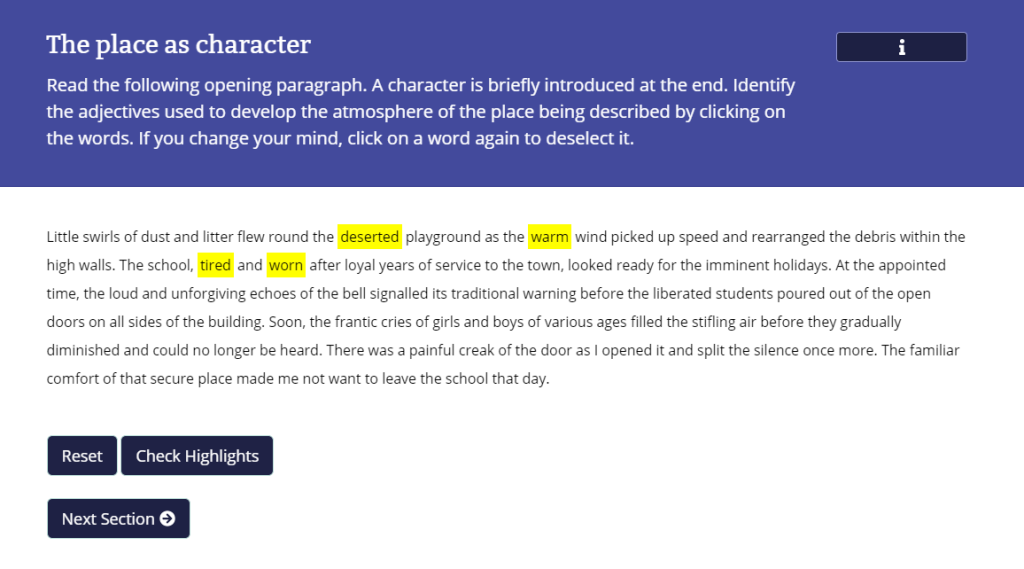
This interactive resource from Eduqas offers an opening paragraph example of a story that creates a real sense of setting.
Students should read through and identify the adjectives used to develop the atmosphere of the place being described.
The second section is where they give it a go themselves, writing out a descriptive passage about a place. There are lists of adjectives they can click on to insert them into the story should they get stuck for inspiration.
Model texts for settings
If you’re after example texts for different settings then head to Literary Wagoll where you’ll find descriptions of an alien world, a fairground, a tree house, a thunderstorm and various others.
Plot advice

This post features an excerpt from the book What’s the Story? Building Blocks for Fiction Writing , and builds on the idea of what a plot is.
It also includes a short list of traditional plot types, and tips for building a compelling plot, like using momentum, creating stakes and giving the characters goals and motives.

Award-winning author Frances Hardinge unpacks how to teach a much sought-after skill in modern storytelling – that of world-building…
When world-building, it’s easy to be distracted by questions of what, who and where, and the temptation to fill your imaginary landscape with creatures, people and places that grab the mind’s eye.
The important part is remembering to work through the how , why and where . Why do any of these things exist, and how do they continue to exist?
Answering such questions can be time-consuming and fiddly, but the answers can often generate plot, detail and unique features for the setting so that it feels more solid.
If you leave them unanswered, then those big, shiny ‘cool’ elements of your setting will tend to feel shallow, like set dressing.
Splendid mayhem of world building
When running a ‘settings workshop’ for a full class (Y6 to Y8) I’ll sometimes encourage everyone to brainstorm the what, who and where first.
I’ll describe a storm at sea, and a ship being wrecked on a rocky shore. I then tell the students that nearly everybody on board has drowned, and that there’s only one survivor – me.
I recover consciousness, and begin looking around to discover where I am. And they’re going to tell me what I encounter.
I start by asking them what I’m lying on. What does it feel like? (At this point, someone may timidly suggest ‘sand’.)
I’ll then tell them that I’m opening my eyes, sitting up and looking around. What can I see?
Initially, the responses will be a little cautious – but before long, the class realises they have an adult character who they can chase around an imaginary landscape, and who will yelp with panic when subjected to countless perils.
They also realise that I won’t block any of their ideas, including all the ‘silly’ ones. At this point, splendid mayhem tends to break loose.
Note, this is not an engine for producing a grim, grittily serious setting. The results tend to be anarchic, enthusiastic, varied and frequently very funny, but in a way that generally gets the whole class engaged.
At a certain point (usually with some difficulty), I’ll call a halt to the brainstorming and get everyone to consider those how, when and why questions.
I’ll encourage them to come up with reasons for such bizarre phenomena coexisting in the same setting and invent a history. It will likely be a strange and amusing history, but that’s not necessarily a problem.
Fates of quirks
Alternatively, one could approach the world-building process from another direction entirely. I’m used to starting from bizarre premises myself, before trying to work out how they will affect the setting.
In effect, I’m starting with those how , when and why questions to help me work out the answers to what , who and where .
To use this approach, a class could be broken up into small groups, each of which is tasked with brainstorming a different country.
Each group can choose a ‘quirk’ – some bizarre characteristic of this world that makes it appreciably different from our own. The students can either come up with their own suggestions, or pick out a single option from a pre-prepared list.
The groups can also be given a list of further questions to consider when fleshing out their worlds and deciding how their chosen quirk has affected everything in that particular country.
Some good sample questions here might include:
- When did the quirk begin? Has it always been there?
- Why does it exist? If nobody knows, why do people think it exists?
- How has it changed people’s beliefs and their behaviour?
- How has it affected the country’s history? Has it resulted in any new conflicts, religions, inventions, laws, jobs or crimes?
- What else is this country like? How advanced is the technology? What is the landscape like? In what other ways is it ‘weird?’
- If you were to visit the country, what odd things would you notice due to its peculiar history?
Quirks to explore
The following examples show how a single quirk can affect a whole setting’s history. Try exploring these ideas in class:
- Cats can use human speech.
- Instead of electricity, the setting has a power source that works in much the same way – except that you age twice as fast while using it.
- In this country, dreams are always distorted visions of something real that’s happening somewhere else at that exact moment.
- 1 in 10 children can teleport a few feet by the time they hit puberty. Most children have no control over it.
- The possession or use of clocks is strictly illegal.
Frances Hardinge is an award-winning children’s author. Her 11th novel, Island of Whis p ers (with illustrations by Emily Gravett), is available now. Browse English games KS3 ideas and more creative writing prompts .
Subscribe to our newsletter Click here to sign up to our newsletter
You'll also receive regular updates from Teachwire with free lesson plans, great new teaching ideas, offers, and more. (You can unsubscribe at any time.)
Which sectors are you interested in?
Early Years
You might also be interested in...

Why join Teachwire?
Get what you need to become a better teacher with unlimited access to exclusive free classroom resources and expert CPD downloads.
Exclusive classroom resource downloads
Free worksheets and lesson plans
CPD downloads, written by experts
Resource packs to supercharge your planning
Special web-only magazine editions
Educational podcasts & resources
Access to free literacy webinars
Newsletters and offers
Create free account
By signing up you agree to our terms and conditions and privacy policy .
Already have an account? Log in here

Thanks, you're almost there
To help us show you teaching resources, downloads and more you’ll love, complete your profile below.
Welcome to Teachwire!
Set up your account.
Lorem ipsum dolor sit amet consectetur adipisicing elit. Commodi nulla quos inventore beatae tenetur.
I would like to receive regular updates from Teachwire with free lesson plans, great new teaching ideas, offers and more. (You can unsubscribe at any time.)
Log in to Teachwire
Not registered with Teachwire? Sign up for free
Reset Password
Remembered your password? Login here


Creative Writing Club
² navigation, writing resources for children aged 6-15 (ks1 ks2 ks3).
Our writing resources and apps will whizz your child the planning process and get their ideas down on the page in record time. 12 writing frames are free – supporting members can unlock all 50. Email [email protected] for info.
Zoom Writers workshops
Young writers can join ‘Spartapuss’ author Robin Price and create their own an epic story. New students are always welcome in our fun ‘drop in’ classes that happen live on Zoom Mon-Thurs every week. www.ticketsource.co.uk/creative-writing
Some of our popular writing themes…

Write a story about Boudica

Join our mailing list
Copyright Creative Writing Club © 2015 2015. All Rights Reserved. Your use of this site signifies your acceptance of its terms.
Resources you can trust
Creative writing: KS3 homework tasks
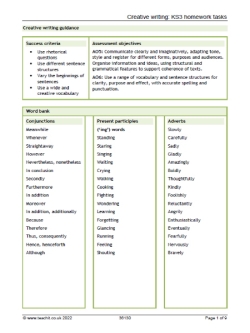
This fun set of five separate homework tasks can be used to build KS3 students' confidence with creative and narrative writing.
With a range of image-inspired creative writing tasks to complete over several weeks at home or as quick writing worksheets in lessons, you'll find carefully scaffolded 'flash' writing activities to build students' writing skills at a sentence level.
The writing activities include a focus on the GCSE assessment objectives A05 and A06, and encourage slow writing techniques to hone their craft as writers and SPaG skills. There's also a word bank to provide support and inspiration for students and to build their vocabulary.
The success criteria for the tasks is also shared with students, who should try to use rhetorical questions, different sentence types and a wide and creative vocabulary.
There's a particular focus on using literary devices, such as personification, similes and metaphors and sensory diction, as well as considering the grammar of sentences to make their writing more varied. This includes using adverbs and present participle verbs to start sentences, and considering how to use more ambitious conjunctions to link compound sentences.
An example set of homework tasks or lesson activities from this downloadable resource:
Task 1: Write two sentences about this image using personification (describing an inanimate object using human qualities).
e.g. Her sword was alive with anger.
Task 2: Create two compound sentences about this image using a range of conjunctions.
e.g. Daylight started to fade and a dark, restless night drew in.
Task 3: Describe the image using a sentence that starts with an adverb.
e.g. Angrily, she raised her sword.
Task 4: Describe this image using your senses.
e.g. The sunlight touched her face, warming her.
All reviews
Resources you might like.
- As Creatives – Creative Learning for Creative Classrooms
- As Creatives Connect – Creative Learning for Creative Classrooms
- Big Maths Days – Maths Activity Days for Secondary Schools
- Book Week Scotland 2024 – School Workshops
- British Science Week 2025 – Reserve your date!
- Catch Up Workshops and Programmes
- Christmas Workshops
- CPD and INSETs for Teachers
- Creative Literacy Programmes for Primary Schools
- Creative Literacy Workshops for Secondary Schools – Workshops & Assemblies
- Creative Maths Workshops for Primary Schools
- CSI: Maths and Literacy Workshops for Primary and Secondary Schools
- Designed Resources
- Drop Down Day
- Family Maths Workshops – A Creative Approach to Securing Parental Support for Maths Priorities
- History Workshops and Shows for Primary Schools
- Holocaust Memorial Day – School Workshops
- International Women’s Day – School Workshops
- Learning Outside the Classroom CPD – Outdoor Learning INSET
- Learning Outside the Classroom Workshops
- Library Workshops – Library Learning with As Creatives
- Literacy Workshops for Primary Schools in Scotland
- Literacy Workshops for Secondary Schools in Scotland
- Literacy Workshops Ireland – Primary and Secondary Schools
- Maths Workshops for Primary Schools in Scotland
- Maths Workshops for Secondary Schools – Creative Maths Workshops for KS3 / KS4 – S1 / S5
- Maths Workshops for Secondary Schools in Ireland
- Maths Workshops for Secondary Schools in Scotland – Maths Week Scotland
- Maths Workshops for Special Schools
- Maths Workshops Primary Schools in Ireland
- Poetry Workshops, Visits and Assemblies for Schools – National Poetry Day
- Refugee Week – School Workshops
- School Arts Week Workshops
- Enterprise Education – School Workshops
- International Schools
- Science Workshops for Primary Schools – Whole School Science Workshops
- Science Workshops for Primary Schools in Scotland
- Science Workshops for Schools in Ireland
- Science Workshops for Secondary Schools – Science Workshops for KS3 and KS4
- Shakespeare Workshops for Schools – KS1/KS2/KS3/KS4 – The Play’s The Thing!
- Summer School Programmes – School Workshops & Programmes
- Teaching Resources
- Trainee Teacher Courses and Universities
- World Book Day 2025 – Whole-School Workshops
- World Space Week 2024 – Space Workshops for Schools, Activities and Assemblies for World Space Week
- World War One Schools Play and Workshops – Living with the War
- Year 6 Transition | Activities and Workshops for Primary Schools
- What People Say
- Case Studies
- Teacher CPD
- Events and Key Dates
- Accessibility
- Privacy Policy
- Terms and Conditions
- Outdoor Learning
- Summer Schools
- Teachers CPD
- Libraries – Library Learning with As Creatives

Creativity is at the core of reading and writing, at the heart of speaking and listening. So our range of Creative Literacy programmes offers KS3-4 / S1-S5 students opportunities to explore and experiment with words in different contexts.
Experiential, exciting and empowering, our imaginative approaches harness tried and trusted approaches from the worlds of drama, visual art and creative writing. Approaches specifically developed to support young people in developing their reading and writing skills – and to boost motivation, build on existing knowledge and enhance progression.
Our workshops include in-person sessions, as well as live streamed workshops beamed straight into your classroom and are a perfect way to celebrate World Book Day , World Poetry Day and Shakespeare Week in your school!
"I was totally in awe of your ability to engage the students; it has really given me food for thought with respect to how to introduce reading skills across our department (I think I have learned as much as the students!)." St Michael’s Catholic School, Aylesbury
"Thank you again from everyone here at Lathom's English Department for an absolutely fantastic day. My colleague's really enjoyed your insight and I will be sure to forward all the positive feedback we receive from pupils as a result of the sessions." (Streamed Literacy Workshop) Lathom High School
Literacy Workshops

Speaking with Confidence

CSI: Reading Skills

The Play’s The Thing

Introducing Shakespeare

Spotlight on Shakespeare

Counting Achievement Through Poetry – National Poetry Day

Poetry in Sight

Soundscape Poetry

Personification Poetry

Refuge Rhymes – Poetry

Cinquains of Truth – People Whose Choices Shaped the World

Poetry Live!

International Women’s Day Poetry Workshop

Outdoor Poetry

Standing on the Shoulders of Giants

Shakespeare for GCSE and A Level / S4 – S6

Ways into Shakespeare (Teacher CPD workshop / INSET Day)
Interested in our literacy workshops, find out more or book a workshop.
You must be logged in to post a comment.

IMAGES
VIDEO
COMMENTS
You can find 48 creative writing tasks with picture prompts in these ppts. Unlike technical, academic, and other forms of writing, creative writing fosters imaginati. ... Creative Writing Tasks for KS3 Students. Subject: Creative writing. Age range: 11-14. Resource type: Worksheet/Activity. 21st Century Literacies Shop. 3.94 203 reviews. Last ...
You'll also find resources on using metaphors and similes and varying sentence structure to make their writing more engaging. Perfect for key stage 3 English classes and GCSE English Language learners. You might also like our non-fiction writing activities for KS3 English.
Designed for KS3 students but easily adaptable for GCSE English Language students, the pack includes resources on both narrative and descriptive writing. ... structure, narrative voice 12) Short story structure analysis 13) Creative writing punctuation workshop with differentiated worksheets 14) Assessment planning lesson 15) Assessment review ...
KS3 creative writing resources Storyboard templates. Whether it's short stories, comic strips or filmmaking, every tale needs the right structure to be told well. ... When running a 'settings workshop' for a full class (Y6 to Y8) I'll sometimes encourage everyone to brainstorm the what, who and where first.
Crafting Creative Writing. Download all resources. Share activities with pupils. Switch to our new English teaching resources. Slide decks, worksheets, quizzes and lesson planning guidance designed for your classroom. Go to English resources. Play new resources video. Slide deck. Lesson details. Lesson video. Worksheet.
Home Writing resources for children aged 6-15 (KS1 KS2 KS3) Our writing resources and apps will whizz your child the planning process and get their ideas down on the page in record time. 12 writing frames are free - supporting members can unlock all 50. Email [email protected] for info.. Zoom Writers workshops. Young writers can join 'Spartapuss' author Robin Price and create their own ...
The Creative Writing Guide for KS3 is an outstanding resource for both tutors and students. This guide covers a plethora of different writing tasks ranging from storytelling (verbal prompt) to formal letters and even newspaper articles. The array of exemplar pieces is both impressive and useful - I am confident that young writers will really ...
A versatile creative writing task which includes a choice of written outcome. The resource guides students to mix and match the various 'elements' and come up with some ideas for a poem, short story or piece of descriptive writing. The elements they are given include a choice of three: titles; settings; times of day; kinds of weather.
This fun set of five separate homework tasks can be used to build KS3 students' confidence with creative and narrative writing. With a range of image-inspired creative writing tasks to complete over several weeks at home or as quick writing worksheets in lessons, you'll find carefully scaffolded 'flash' writing activities to build students ...
So our range of Creative Literacy programmes offers KS3-4 / S1-S5 students opportunities to explore and experiment with words in different contexts. Experiential, exciting and empowering, our imaginative approaches harness tried and trusted approaches from the worlds of drama, visual art and creative writing.